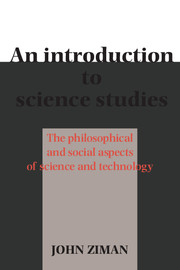Book contents
- Frontmatter
- Contents
- Preface
- 1 ‘Academic’ science
- 2 Research
- 3 Validity
- 4 Communication
- 5 Authority
- 6 Rules and norms
- 7 Change
- 8 The sociology of scientific knowledge
- 9 Science and technology
- 10 Pure and applied science
- 11 Collectivized science
- 12 R & D organizations
- 13 The economics of research
- 14 Science and the State
- 15 The scientist in society
- 16 Science as a cultural resource
- Index
11 - Collectivized science
Published online by Cambridge University Press: 05 August 2012
- Frontmatter
- Contents
- Preface
- 1 ‘Academic’ science
- 2 Research
- 3 Validity
- 4 Communication
- 5 Authority
- 6 Rules and norms
- 7 Change
- 8 The sociology of scientific knowledge
- 9 Science and technology
- 10 Pure and applied science
- 11 Collectivized science
- 12 R & D organizations
- 13 The economics of research
- 14 Science and the State
- 15 The scientist in society
- 16 Science as a cultural resource
- Index
Summary
‘We've got no money, so we've got to think.’
Ernest Rutherford.Societal demand
Even though the differences between ’science’ and ‘technology’ (§9.7) between ‘research’ and ‘development’ (§10.1) and between ‘pure science’ and ‘applied science’ (§10.7) have never been easy to define in principle, an institutional distinction between the academic and industrial modes of research was maintained in practice throughout the first half of the twentieth century. In the past few decades, however, this gap has been steadily closing. Some metascientific observers follow Jerome Ravetz in describing this process as the industrialization of science, implying that the industrial mode of research has become dominant. The evidence is, however, that a more general transformation is taking place, to a new collectivized form in which characteristics of both the academic and industrial modes are intermingled.
This transformation is often supposed to have come about solely by societal forces acting on science from the ‘outside’; as we shall see (§11.2) it is also a natural result of its own internal development. The external influences are obvious. The demand for more and more R & D to meet societal needs (§9.1) has not only had the effect of expanding industrial science on a very large scale: it has also had an immense effect on the scale and style of academic science.
- Type
- Chapter
- Information
- An Introduction to Science StudiesThe Philosophical and Social Aspects of Science and Technology, pp. 132 - 139Publisher: Cambridge University PressPrint publication year: 1984



